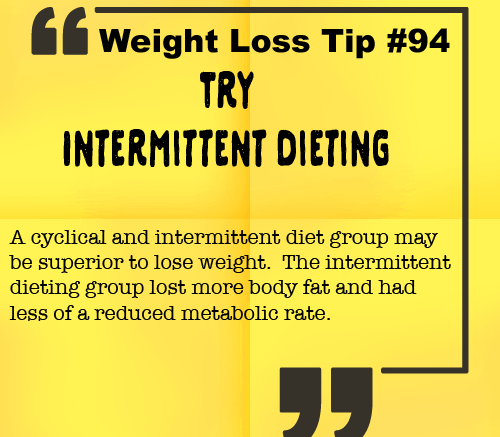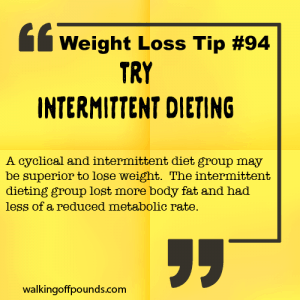Intermittent Dieters may lose more weight.
Everything I have read until recently has suggested the key to dieting is consistency. When most of us decide to lose weight, we usually set up a plan to exercise and reduce our calories over an extended period without any breaks. Each day is the same with a little variation in the foods you eat. The idea is plan consistency without falling to temptations. Almost every expert I have talked to recommends that you never take breaks and there are no diet holidays. To them, the idea is to learn a new pattern of life that you must make routine and intermittent is the enemy against setting a new routine. I am sure you have become depressed and felt you have failed with each dietary splurge. If only you had stuck to your plan and maintained healthy eating for a couple of more weeks but now you have derailed the train. Now you are circling the bottom depressed and be grabbing your comfort food to quiet your depression with sweet embrace of all that junk food in the back of your pantry that you have saved for a rainy day. But it turns out you have found what appears to be a better way to diet. So, instead of this being the rainy day you save that chocolate for, the sun is coming out and all you have to do it moderate the binge a little.
Does intermittent dieting work? Yes and no. I wrote an article on the research a while back, and it does appear to support intermittent dieting. The research was performed in the MATADOR study, and there have been a few journals articles on this study. This 16-week study showed that intermittent dieting appears to be superior for both fat and weight loss with less impact on reducing your metabolism. To read more about this, you can visit my article: Research: A Break From Dieting May Help Weight Loss.
The key consideration is an intermittent energy restriction is not a return to the old habits. It is also not the old day-off technique that has been popularized in the past but he key difference is the day-off is not a day of binge or splurge. Instead, the days-off focus on alternating 2-week blocks of energy restriction with 2-week blocks of energy balance. After a period of energy restriction, the caloric requirement was recalculated for the new balance, so that you are taking in the energy you need and no more. This concept is based on the MATADOR study featured in my article on the research behind the concept of intermittent dieting. In the study, the intermittent dieters lost more weight and they kept more of it off longer than the constant dieters.
The problem with this sort of study is how it is often overanalyzed or misinterpreted to mean that you can take a holiday from dieting. That will all depend on what you mean by a holiday. The subject is this study returned to the caloric requirement and did not strap on the feed bag. In other words, they did not feast or have anything they wanted. That is a subtle difference but an important one. Intermittent dieting makes sense from an evolutionary perspective. Humans have survived periods in which food was sparse by adapting metabolically. Intermittent dieting reduces your bodies ability to adapt and maintain a metabolic advantage to lose more weight. probably went through periods where food was sparse and times when it was abundant. It makes sense that our bodies would respond well to this style of eating.
The bottom line: Intermittent energy restrictions resulted in a greater fat and weight loss. A cyclical and intermittent diet group may be superior to lose weight. It also appears to reduce the compensatory drop in metabolism that commonly occurs with weight loss. The intermittent dieting group lost more body fat and had less of a reduced metabolic rate. I recommend that you consider it if you can return to a restriction afterward. If not, you might not be a good candidate for this sort of diet.









Be the first to comment on "Weight Loss Tip: Try Intermittent Dieting"